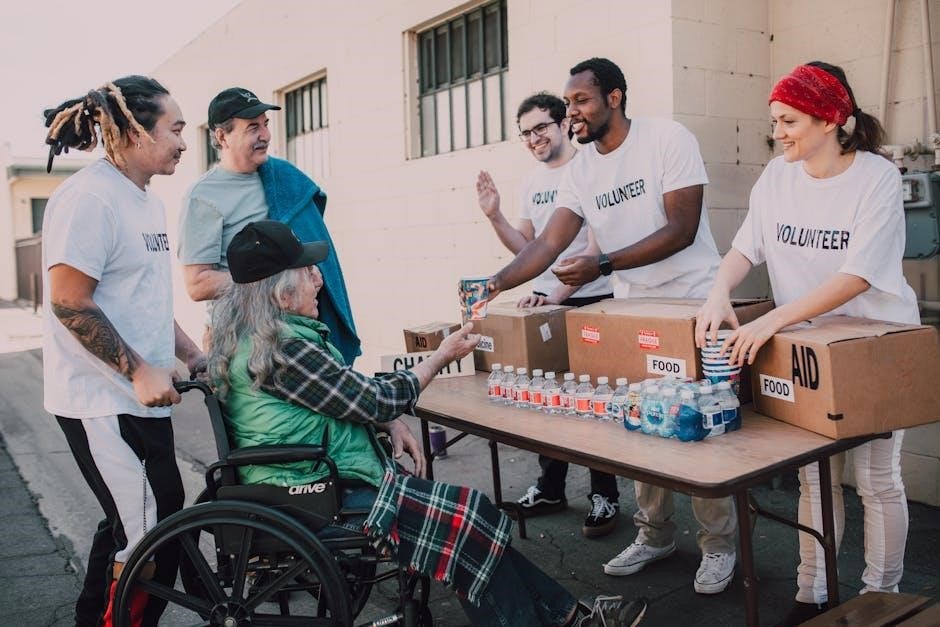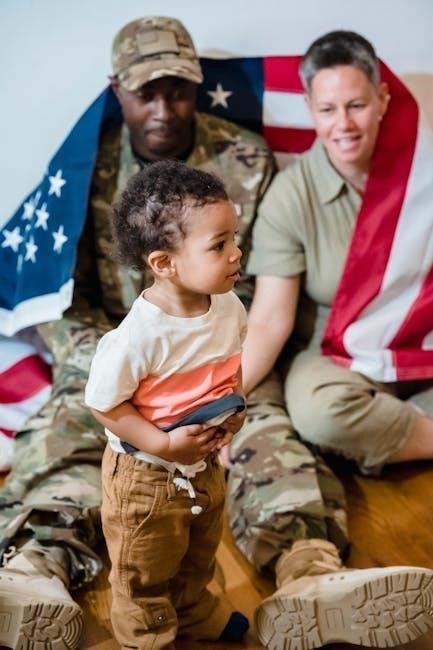Welcome to the Salvation Army Donation Guide‚ your resource for understanding donation values and making a meaningful impact. Discover how your contributions transform lives and support vital services.
Overview of Salvation Army’s Mission and Values
The Salvation Army‚ founded by William Booth‚ is a Christian organization dedicated to spreading the gospel and serving humanity. Its mission is to meet human needs without discrimination‚ providing food‚ shelter‚ and emotional support. Rooted in faith‚ the Salvation army operates in 134 countries‚ assisting over 27 million people annually. Their work includes disaster relief‚ rehabilitation programs‚ and community services‚ all motivated by the love of God and a commitment to helping those in distress.
Why Donating to Salvation Army Matters
Donating to the Salvation Army directly impacts millions of lives worldwide. Your contributions fund vital services like food distribution‚ disaster relief‚ and rehabilitation programs. By supporting their mission‚ you help provide shelter‚ job training‚ and emotional care to those in need. Every donation strengthens communities and uplifts individuals‚ aligning with their commitment to serve without discrimination. Your generosity makes a tangible difference‚ ensuring the Salvation Army can continue its transformative work in 134 countries‚ touching over 27 million lives annually.

How to Donate to Salvation Army
Schedule a pickup or find a drop-off location near you using your zip code. Call 1-800-SAL-ARMY for assistance with donations and local service information.
Scheduling a Pickup or Finding Drop-Off Locations
Scheduling a pickup or finding a drop-off location is simple and convenient. Enter your zip code on The Salvation Army’s website to locate the nearest services. Use the interactive map to identify drop-off points or arrange a pickup for larger donations. This service ensures your contributions reach those in need efficiently. For additional assistance‚ call the 1-800-SAL-ARMY hotline to speak with representatives who can guide you through the process. This streamlined approach makes donating hassle-free while supporting vital community programs.
Using the 1-800-SAL-ARMY Hotline for Assistance
The 1-800-SAL-ARMY hotline provides direct support for donors seeking assistance with scheduling pickups or understanding donation processes. Representatives are available to answer questions‚ guide you through drop-off procedures‚ and offer insights into how your contributions impact local communities. This service streamlines the donation experience‚ ensuring a seamless and efficient process.
By calling the hotline‚ you can receive personalized help‚ verify acceptable items‚ and learn about special programs or initiatives in your area. This resource empowers donors to make informed decisions and feel confident in their support of The Salvation Army’s mission.

Understanding Salvation Army Donation Values
Donation values guide how contributions are assessed for tax deductions and support community programs‚ ensuring transparency and maximizing impact for those in need.
Guidelines for Tax Deductions on Donations

When donating to The Salvation Army‚ your contributions may qualify for tax deductions. To claim deductions‚ keep receipts and ensure items are in good condition. The IRS requires documentation for donations over $250. Fair market value guidelines apply to items like clothing‚ furniture‚ and household goods. Non-cash donations must be itemized on tax returns. Consult a tax professional to ensure compliance with IRS regulations. For vehicle donations‚ a 1098-C form is often required. Transparency and proper documentation are key to maximizing your tax benefits while supporting vital community programs.
Estimating the Value of Your Donated Items
To estimate the value of your donated items‚ use The Salvation Army’s valuation guide‚ which provides standard ranges for categories like clothing‚ furniture‚ and household goods. For tax purposes‚ values should reflect the items’ fair market value‚ considering their condition. Document each item’s value‚ especially for higher-priced items‚ and use IRS guidelines for non-cash donations. Keep receipts and consider consulting a tax professional to ensure accurate and compliant valuations‚ helping you make a meaningful impact while maximizing your tax benefits.

What Items Salvation Army Accepts
The Salvation Army accepts donations of clothing‚ furniture‚ household goods‚ books‚ and more. These items support vital community programs and services‚ making a tangible difference in lives.
Listing of Acceptable Items for Donation
The Salvation Army accepts a variety of items‚ including gently used clothing‚ furniture‚ household goods‚ books‚ toys‚ and small appliances. Items must be in good‚ clean condition to ensure they can be sold or distributed effectively. Clothing and textiles‚ such as shirts‚ pants‚ dresses‚ and bedding‚ are always in demand. Furniture donations‚ like sofas‚ tables‚ and chairs‚ are also welcome if they are sturdy and functional. Household items‚ including kitchenware‚ linens‚ and decor‚ are accepted. Additionally‚ books‚ toys‚ and working electronics can be donated to support families in need. Your contributions directly fund life-changing programs and services.
Items That Cannot Be Accepted
The Salvation Army cannot accept certain items due to safety‚ legal‚ or logistical reasons. These include firearms‚ ammunition‚ hazardous materials‚ large appliances‚ and items in poor or soiled condition. Mattresses‚ box springs‚ and broken electronics are typically declined. Items requiring extensive repair or posing liability risks‚ such as construction materials or medical equipment‚ are also not accepted. Donors are encouraged to check local guidelines‚ as specific restrictions may vary by location. Ensuring donations are safe and resale-ready helps maximize their impact and support community programs effectively.

The Impact of Your Donations
Your donations fund vital programs‚ support vulnerable populations‚ and provide disaster relief. They also aid rehabilitation efforts and education‚ transforming lives and communities nationwide.
How Donations Support Local Communities
Your donations directly support those in need‚ funding essential services like food‚ shelter‚ and disaster relief. They also enable education‚ job training‚ and youth programs‚ fostering self-sufficiency. By assisting over 27 million people annually in the U.S.‚ your contributions address poverty‚ homelessness‚ and inequality. Donations also provide utility assistance‚ emotional support‚ and lodging‚ ensuring vulnerable populations receive care. This widespread impact strengthens communities‚ offering hope and dignity to individuals in crisis. Every donation creates a ripple effect‚ helping families and individuals rebuild their lives with compassion and care.
Funding Rehabilitation Programs and Services
Your donations support Salvation Army rehabilitation programs‚ aiding individuals overcoming addiction and rebuilding their lives. These services include counseling‚ job training‚ and emotional support‚ fostering self-sufficiency. With over 100 years of operation‚ these programs provide a safe environment for recovery. Donations also fund vital resources like food‚ shelter‚ and medical care for participants. By addressing the root causes of addiction‚ your contributions help individuals achieve lasting change. Every dollar invested in these programs brings hope and transformation‚ enabling people to regain dignity and reintegrate into their communities with purpose and resilience.

Additional Tips for Donors
Ensure donated items are in good condition and relevant to current needs. Check local guidelines to maximize the impact of your contributions and support community programs effectively.
Preparing Items for Donation
Clean and sort donations to ensure they are in good condition. Pack items securely to prevent damage during transport. Separate clothing‚ furniture‚ and household goods. Include accessories like hangers or batteries. Check for stains‚ broken zippers‚ or missing parts. Ensure electronics and appliances are functional. Remove personal items from donated goods. Be mindful of prohibited items like large appliances or hazardous materials. Clearly label boxes for easy identification. Your thoughtful preparation helps The Salvation Army efficiently distribute items to those in need‚ maximizing the impact of your generosity.
Obtaining Receipts for Tax Purposes
When donating to The Salvation Army‚ request a receipt at the time of your donation. These receipts are essential for tax deductions and can be obtained by visiting your local Salvation Army center or calling 1-800-SAL-ARMY. Keep the receipt safe‚ as it serves as proof of your contribution for tax filing purposes. The Salvation Army ensures receipts are provided in compliance with IRS guidelines for charitable donations‚ making it easier for you to claim your tax deduction while supporting their mission.

Frequently Asked Questions
Discover answers to common questions about Salvation Army donations‚ including accepted items‚ tax deductions‚ and pickup services‚ to ensure a smooth donation process.
Common Questions About Salvation Army Donations
The Salvation Army operates in 134 countries‚ assisting over 27 million people annually in the U.S. alone. Donations support disaster relief‚ food‚ shelter‚ and rehabilitation programs. Items like clothing‚ furniture‚ and household goods are accepted‚ but not large appliances or broken items. Tax receipts are provided for donations‚ and values can be estimated using IRS guidelines. Donations stay local‚ funding community services and helping those in need. For more information‚ visit your local Salvation Army or call 1-800-SAL-ARMY. Your contributions make a meaningful difference in transforming lives.

Clarifying Myths About Salvation Army

Despite its widespread impact‚ misconceptions about The Salvation Army persist. One common myth is that donations do not directly benefit local communities‚ but in reality‚ funds and items donated stay local to support vital programs. Another myth is that The Salvation Army only serves those of a specific faith‚ when in fact‚ it provides assistance to all in need without discrimination. Additionally‚ while the organization is faith-based‚ its services are not limited to religious activities but encompass food‚ shelter‚ rehabilitation‚ and disaster relief. Transparency and efficiency in operations ensure donations make a tangible difference.
